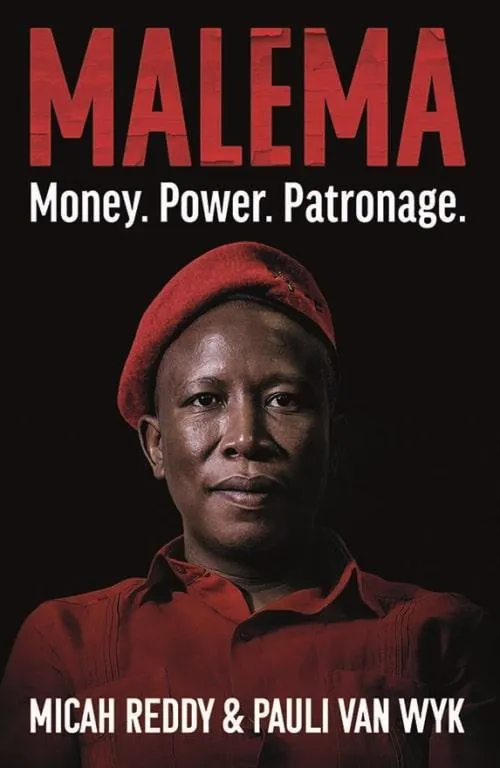Malema exposed: New book on EFF leader lifts the lid on R21.6 million property empire hidden from Parliament

A new book, “Malema: Money. Power. Patronage.”, is set to be published soon and offers an in-depth look at the financial dealings of Julius Malema, one of South Africa’s most controversial political figures
Image: Supplied
Economic Freedom Fighters (EFF) leader Julius Malema, who is known for his vocal criticism of corruption, is at the centre of explosive new revelations that suggest he owns a R21.6 million property empire - despite declaring no property ownership as a Member of Parliament.
A new book, ”Malema: Money. Power. Patronage”, by investigative journalists Micah Reddy and Pauli van Wyk, is set to be published on September 19.
The book lifts the lid on Malema’s financial affairs and his alleged misuse of political power for personal gain.
The authors stress that the work is not a biography, but a detailed exposé of the EFF leader’s financial dealings.
According to the book, Malema’s undisclosed property empire includes lavish renovations such as a multi-storey Johannesburg home that was demolished and rebuilt twice, a luxury lodge in Polokwane fitted with imports from Dubai, and a Limpopo smallholding complete with basketball and tennis courts.
These upgrades, the book says, push the value of the properties far beyond their initial R21.6 million acquisition cost.
Malema is said to control at least 10 properties via three family trusts and a private company, all benefiting himself, his wife Mantoa Matlala, and their children.
While Malema declared his association with the trusts in Parliament, he failed to disclose the assets they contain. This has raised many eyebrows and sparked serious ethical and legal questions.
Malema’s declarations to Parliament, as captured in the report adopted and released by the Joint Committee on Ethics and Members’ Interests, show no ownership of land or property.
However, the revelations made in the books tell a different story.
His only declared outside business interest is a directorship in Mgagao Shamba, a company involved in farming, events, and sales.
Under the section for gifts and hospitality, Malema declared receiving a bottle of wine and a box of Lindt Lindor chocolates from Liu Kaiyang of the Chinese Embassy.
He did not declare the value of the wine. He also listed receiving sheep worth R7,000 from BaPedi Queen Lenaganabatho II Manyaku Thulare.
Malema declared no interest-free loans, sponsorships, or property ownership.
He listed the following trusts under his name:
- Ratanang Family Trust – Beneficiary: Ratanang Malema (his son).
- Munzhedzi Family Trust – Beneficiaries: Malema, his wife, and their children.
- Kopano Charity Trust – Beneficiary: Listed for charitable purposes.
- Mazimbu Investment Trust– Beneficiaries: Malema, his wife, and their children.
Despite disclosing these trusts, the book states that Malema kept the extent of the trusts' assets secret from Parliament.
Six of the properties are believed to be bonded.
“This book shows how, over the years, Malema has refined his modus operandi, making it difficult for the justice system to hold him accountable,” the authors wrote.
They argue that Malema represents a larger, systemic issue in South African politics, where public grievances are often exploited for personal gain.
“It also tells a bigger story: about the insidious ways money courses through South African politics and how self-styled radical leaders exploit valid grievances about inequality to enrich themselves, stealing from the very people they claim to fight for.”
“Independent Media Lifestyle” reported that the book delves into forgotten scandals in Limpopo, where Malema and his associates allegedly manipulated public systems for personal enrichment.
It also details how funds from the now-defunct VBS Bank allegedly ended up in the hands of Malema and his former deputy, Floyd Shivambu.
Shivambu left the EFF last year, briefly joined the MK Party, and recently launched his own political outfit, the Afrika Mayibiye Movement.
Van Wyk said Malema was chosen as a subject because his political and financial dealings intersect with multiple high-profile corruption cases.
“He is vocal about others’ alleged corruption, from Jacob Zuma to the Gupta family, while evidence of his own dealings keeps surfacing. He was the ideal politician to study,” she said.
The book also alleges that the EFF’s controversial rent-seeking practices in metros were tolerated by parties such as ActionSA, led by Herman Mashaba, in exchange for political support.
“This speaks to how the justice system and Parliament continually fail to hold corrupt politicians and their business allies accountable - posing a serious threat to South Africa’s democracy,” Van Wyk said.
IOL News reached out to EFF national spokesperson Sinawo Thambo for comment, but no response was received at the time of publication.
simon.majadibodu@iol.co.za
IOL Politics